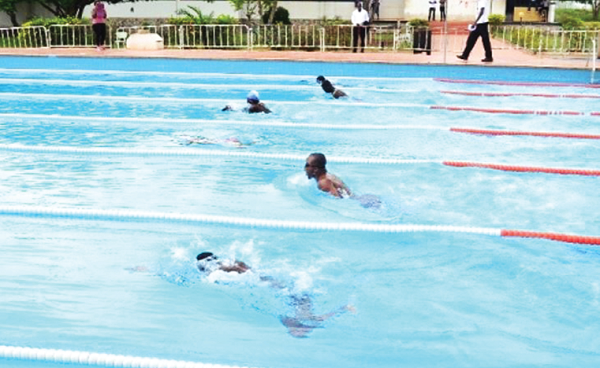Is swimming trending in Ghana?
Swimming has become a sporting activity trend in Ghana. Some researchers even believe that swimming can reduce the risk of death. Some other studies have shown that swimming may help lower blood pressure and control blood sugar.
Researchers have suggested that adults need 150 minutes of moderate activity or 75 minutes of vigorous activity each week (https://www.mayoclinic.org/healthy-lifestyle/weight-loss/in-depth/exercise/art-20050999).
This means that one can derive benefits from swimming.
Interestingly, an hour of swimming can be compared to running in terms of burning calories. The Centre for Disease Control (CDC) found that swimming is the fourth most popular activity in the United States.
They explain that that is due to its numerous health benefits.
Swimming, science
Are Ghanaians aware of the scientific benefits of swimming? Swimming presents holistic body health. Marcin, A (2017) in an article outlined the following health benefits of swimming: increases your heart rate without stressing your body; tones muscles, builds strength and aids endurance.
Apart from the muscles which benefit when one swims, the cardiovascular system is also another area where one benefits with strong heart and lungs.
Interestingly, researchers believe that swimming cuts your risk of death as espoused by the Centre for Disease Control (CDC) report. The report found that compared with inactive people, swimmers have about half the risk of death.
The CDC also reports that swimming exercises support those with arthritis as they improve the use of their arthritic joints without worsening symptoms. It further notes that people with rheumatoid arthritis have shown more health improvements after participating in hydrotherapy (exercising in warm water) than with other activities.
Water-based exercise can also improve the use of affected joints and decrease pain from osteoarthritis.
Marcin, A (2017) notes that swimming can be a safe exercise option for people with arthritis, injury, disability and other issues that make high-impact exercises difficult.
Marcin further notes that swimming may even help reduce some pain or improve recovery from an injury.
Marcin, A (2017) found out that the humid environment of indoor pools was ideal for making swimming a great activity for people with asthma.
This was confirmed by an earlier study by Sable et al. (2012) which found out that breathing exercises associated with the sport, like holding your breath, could help you expand your lung capacity and gain control over your breathing.
Swimming is an efficient way to burn calories. The Mayo Clinic held the view that a 160-pound person burnt approximately 423 calories an hour while swimming laps at a low or moderate pace.
Better sleep pattern was reported when one swam. This was confirmed in one study by Reid et al. (2010) which involved older adults with insomnia. The older adult found improvement in his quality of life and sleep after engaging in regular aerobic exercise. This is good news for older adults struggling to sleep and who can swim as well.
For mood or mental support, a clinical trial by Neville et al. (2014) examined a small group of people with dementia and found progress in mood after taking part in a 12-week aquatic programme. On the part of stress, one study in 2015 was published in the International Journal of Physical Education, Sports and Health where the researchers surveyed a group of swimmers instantly before and after swimming at a YMCA in New Taipei City, Taiwan. Of the 101 people surveyed, 44 reported being mildly depressed and feeling stress related to the fast-paced life. After swimming, the number of people who still reported feeling stressed decreased to just eight. The researchers conclude that swimming is a potentially powerful way to relieve stress quickly.
Protocol
Swimming is another good form of Naturopathic protocol that can have a holistic impact on your health. For those swimmers, the science is clear for you to swim more. For those considering swimming to derive the benefits, including myself, we can start from somewhere by getting a swimming lesson trainer.
We must obey the rules at the pool whether experienced or inexperienced. Though generally safe, for those injured or who have certain medical conditions, always confirm with your doctor.
Marcin, A (2017) also explained that people with skin conditions such as psoriasis, for example, might get more irritated in the chlorinated pool water. It is best to seek medical advice first.
The writer is a Professor of Naturopathic Healthcare/President, Nyarkotey University College of Holistic Medicine & Technology (NUCHMT)/African Naturopathic Foundation.
He adheres to strict sourcing guidelines/researched studies and academic papers in his articles, which are for educational purposes only and do not serve as medical advice for treatment.



